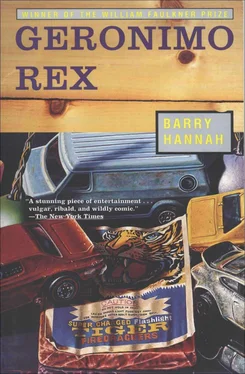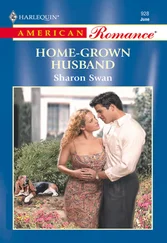“Oh, no. Oh, simple ass,” he said. “I was thinking about my camera. I was thinking about where or when I might see him to get a shot, looking around at the goddam miserable light in case I could get one anywhere, and I just saw that bastard.” He slapped my coat pocket. “Let me out.”
I pulled over and stopped the car. I didn’t care. It was all right with me just then if I never heard the moaning or the disgust or the imprecations from Fleece ever again.
“You can’t walk around with a pistol , you rube.”
Then I told him to get out. He seemed surprised, but tried to hide it by slumping carelessly in the seat. He wasn’t getting out. And when he spoke, after I drove on, he changed his voice into a more equable tone.
“The pistol is just there , Fleece,” I said. “I don’t have to use it. It makes me feel like something may be coming any minute. I walk around, you understand, watching out turn after turn, like I was in a wild country. It sets a light on the things or people I see. I see what I see in the light of what it might be if I pulled out the gun, and what things would do, how things would change.”
“You talk like you want to discover a country, is the hopeless thing,” said Fleece, in the new tone of an impartial observer. “You’ve been reading about that Indian. But, although it’s true you look like Hernando DeKotex with the swamp boots, you ought to know that Mississippi has already been discovered, and that… it’s enough of a rectangle of poor woe without you putting on that costume and pistol roaming around out of some pageant of gunslinging. They could use you in the United Daughters of the Confederacy as a salute-shooter at the cemetery in their birthday of the Civil War service. I thought it was funny you scaring that organist with a pistol. But I don’t think it’s funny you carrying it around ever after.”
“Another thing I want to settle,” I said. I was fed up. “Whichever tone of voice you take, I don’t want to hear so much of it, for godsake.”
We’d just passed the King Edward Hotel. Fleece had been almost deathly quiet. Suddenly he said to pull over. I could go where I wanted to but he was where he wanted to be. I found a parking space. Bobby Dove took out a pair of snap-on sunglasses and fixed them on his regular hornrims.
“All right.” He urged his nose up to test them, and I could tell he was unable to see much. As he’d complained a few minutes ago, the light today was dismal; there were odd cloud strands the color of coal in the sky — odd for April, I mean. “I bale out. See me at Al’s Half Shell in an hour if you want to see a scared mother.”
“Where do you think you are?”
“Just beyond Peter’s real estate office. There was an ‘open’ sign on it. He might remember me, but I want a shot of him head-on, to go with the letters. I’ve almost forgotten what the old pecker looks like.” Fleece embraced the camera and opened the door.
“He ran at you with a belt, Bob,” I told him, getting out myself. Fleece looked terribly small with that elaborately sensitive camera clutched to him, and in the sunglasses.
“No gunslingers. Go on.”
I sat back in the car, took out the pistol, put it under the seat, with Fleece watching. All ready to escort. I wanted to look at the man myself. Fleece began walking toward the narrow box of glass which was Peter’s office front, and I came up. In the window was a showcase, with reading material laid on a display board. One item invited you to buy a lot on a lake in beautiful Canton Harbors, Madison County, and here is the number you dial; to one side of the other display literature was the front page of a newspaper called “The Paleface Roll-Caller.” Nearby it was an outstretched page of the Jackson paper with the letter in “Our Reader’s Viewpoint” circled in brown ink, the same shade as in the letters from Whitfield, but I’d already read the newspaper letter and went back to “The Paleface Roll-Caller.”
Half of the front page was occupied with a history of “The Paleface Roll-Caller.” The editor was a simple gentleman farmer from Alabama who had never thought of putting a newssheet together until one winter he was at a convention of Big Dutchman farm machinery dealers in Chicago and was walking along minding his own business when a Negro dope addict asked him for five dollars, and when he refused, in his natural Alabamian accent, the Negro pulled out a sharpened “church-key” on him and called him a “paleface.” The Negro told him to call his friends too, because he wanted to cut them up as well. The Alabamian began shouting for his life, but, though the opposite sidewalk was covered with white citizens, no man came to his aid. The Negro laughed and told him he had no friends. He told the Alabamian that he wasn’t worth cutting, and, leaving casually — this criminal — he told the Alabamian that he knew some “intelligent” palefaces that, before the day was over, would not only give him the money he needed, but would, one of those women palefaces, remove his sordid rags and kiss him all over the duration of his heroin spell. This was in Chicago, U.S.A. The editor had never seen the Situation like this before. He’d been too simple. Now he had seen the Situation. Even though he lost money on “The Paleface Roll-Caller,” it must appear.
It was time to go in if we were going in, and we did. Fleece had the camera up ready to snap and run, but there was no one in the front room. There was a carpet and three chairs and a table, with more reading matter on it, but no Whitfield Peter. I sat down and took up another copy of “The Paleface, etc.” The same history was on the front page. Apparently a permanent space was given over to it every issue. On the rest of the front page, I read about JFK, how Secret Service men had to drag him out of one Harlem brothel after another; and about a “certain gynecologist” in D.C. who had performed a number of abortions while Jackie was a gadabout reporter, pre-JFK. Other articles spoke of grassroots upheaval in the Catholic Church if it continued to hang the threat of excommunication over certain white patriots in Louisiana. Another harked back with some incoherent curse against Eleanor Rooseveltstein. The last returned to Jackie. Her nose was as “Semitic” as the nose of Lady Bird Johnson, wife of a key traitor among the Democrats. There was some bad spelling in the paper, but it was a wonder of consistency. Bobby Kennedy, who had so many children he didn’t know what to do besides dance and sleep with Jackie, had recently met with Negro “leaders,” and made a secret promise of billions to them. Jackie had had her influence.
“Somebody’s back there,” said Fleece. There was a room off the narrow hall in the back. I hadn’t noticed the light. A shadow burst out against the opposite wall. I was frightened too. I started bellowing, putting it on.
“Shit fire , finally the truth! Everything in this paper’s the real god rightout trooth! All of it, ever shitfire comma!”
Peter came out in a wide, lank wool suit colored like a speckled eggshell. It was in a style which had never either come or gone, as far as I knew. At last I saw his face. There were locks of grayish tan hair, parted high, and the actual face was flushed like a doll’s, red cheeks and lips and also the ears. There was the mask of a pretty, babyfat boy behind the whiskers, the crow’s-feet wrinkles at the eyes, and the liver spots; there was a vulgar trapped boy in his face, and he horrified me. I couldn’t move. I saw he was thinking that we were rednecks.
“The truth always has good manners,” he said. This was the first time I heard him speak. He was scolding me. But his voice was so pleasant it would put you to sleep. There was none of that hateful Southern yap in it. We got up and left, in fact, to the soothing ring of it.
Читать дальше












